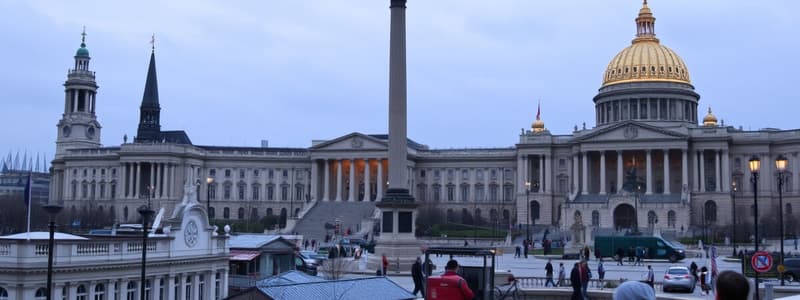Podcast
Questions and Answers
What is Politics?
What is Politics?
The process that determines the distribution of power and resources.
What is Political Science?
What is Political Science?
A branch of social sciences that deals with the study of politics.
Match the fields of study in Political Science with their descriptions:
Match the fields of study in Political Science with their descriptions:
Political Theory = Study of contributions from thinkers like Aristotle and Plato Comparative Politics = Analyzes various constitutions and political factors among countries Public Administration = Study of government policy implementation International Relations = Deals with political-economic interactions between nation-states
What defines a State?
What defines a State?
Sovereignty refers to a state's ability to be influenced by outside factors.
Sovereignty refers to a state's ability to be influenced by outside factors.
What type of government is ruled by a single person?
What type of government is ruled by a single person?
What is Democracy?
What is Democracy?
Which system recognizes the president as the highest official?
Which system recognizes the president as the highest official?
What is Coercive Power?
What is Coercive Power?
Which type of power is based on the knowledge and skills of an individual?
Which type of power is based on the knowledge and skills of an individual?
Flashcards are hidden until you start studying
Study Notes
Politics and Political Science
- Politics determines the distribution of power and resources in society.
- Political Science is a social science branch focused on studying political phenomena.
- Political Scientists analyze connections between political events and conditions.
Fields of Study in Political Science
- Political Theory: Studies the contributions of thinkers like Chanakya, Aristotle, and Plato.
- Comparative Politics: Analyzes and compares constitutions and political factors across nations.
- Public Administration: Examines how government policies are implemented and the role of public service.
- International Relations: Explores political-economic interactions among nation-states and organizations.
- Public Law: Investigates the relationship between government and citizens.
- Political Methodology: Utilizes quantitative methods to study political phenomena.
Key Concepts in Political Science
- State: An organized political community under government authority.
- Population: The people comprising the state.
- Territory: The defined physical area occupied by the state’s population.
- Government: Administers and controls the state.
- Sovereignty: A state's ability to govern itself independently.
- Legitimacy: The recognized right of a government to exercise authority.
- Governance: Encompasses all actions related to governing a state’s territory and population.
- Ideology: A collection of beliefs and ideas guiding individual and group behavior.
- Political Ideology: The principles and theories guiding government actions.
Forms of Government and Governance
-
Monarchy: Government ruled by a single individual.
- Constitutional Monarchy: Monarch's powers are limited by a constitution.
- Absolute Monarchy: The monarch wields absolute power without limitations.
-
Oligarchy/Aristocracy: Governance by a small, elite group.
-
Democracy: Government driven by the rule of the people.
- Direct Democracy: Citizens directly participate in government decisions.
- Representative Democracy: Elected representatives act in the interest of the citizens.
- Presidential System: The president is the highest official and head of the executive.
-
Congressional System:
- Unicameral: One legislative house.
- Bicameral: Two legislative houses (e.g., House of Representatives and Senate).
-
Parliamentary System: Close relationship between the legislative and executive branches, led by a prime minister.
-
Presidential-Parliamentary System: Combines elements of both systems; president elected by citizens appoints a prime minister.
Power and Accountability
- Power is key to understanding politics and governance; it involves authority over people and influences their lives.
- Power is the capacity to carry out one's will and exert control over others.
- Closely related to authority, which is the legitimate right to exercise power.
Types of Power
- Coercive Power: Compelling others through threats and punishment.
- Reward Power: The ability to offer rewards and benefits.
- Expert Power: Derives from an individual's skills and knowledge.
- Legitimate Power: Based on an individual’s established role and duties.
- Referent Power: Emerges from a person's charm and ability to attract followers.
Max Weber's Classification of Authority
- Charismatic Authority: Based on individual personal qualities that inspire devotion.
Studying That Suits You
Use AI to generate personalized quizzes and flashcards to suit your learning preferences.




